
Using artificial intelligence (AI) in either B2C or B2B marketing campaigns seems contradictory.
A machine making intelligent choices rather than a human, with all its consciousness and emotionality, is counter-intuitive. After all, marketing is all about leaning on our emotions, inducing us to make decisions based upon a seemingly personalised or relatable message.
Yet recent data would suggest most are on board with AI.
In the 2021 State of Marketing AI Report, released by Drift and Marketing AI Institute, “41% of marketers are achieving revenue acceleration with AI today” and “56% believe AI will create more marketing jobs than it eliminates over the next decade”.
 Read New Statesman Media Group’s free white paper: How to define, discover and develop actionable leads in B2B marketing
Read New Statesman Media Group’s free white paper: How to define, discover and develop actionable leads in B2B marketing
Convincing marketers to use AI
In the same 2021 State of Marketing AI Report mentioned above: “50% [of responders] classify their understanding of AI terminology and capabilities at the beginner level.”
This resonates with Carlos Doughty, CEO and founder of MarTech Alliance.
When asked how he would sell the concept of martech to senior marketers or business leaders who have never used it before, he says: “Explain things in plain English. Set the scene of the transformational change we have all seen play out in technology on a personal level to highlight the need to adapt.
“And explain the connection of tech to marketing to help and how this helps us move quicker and adapt more easily to the digitised world we now live in.”
It is perhaps useful to divide the practical application of AI in B2B marketing into two, distinct areas: automation and insight/engagement.
Automation is already an accepted part of the marketing landscape and even in its simplest form, it can be used to streamline and optimise email exchanges.
Business-process automation tools can cast a wide net in B2B email marketing, following up non-responders without the need for human interaction, and, likewise, automatically nurturing those who do respond.
And when you add robots to equation with robotic process automation (RPA), then you can start collating data from multiple systems in seconds that would ordinarily take a human workforce days and weeks.
In this case, the robots are actually computer code, which means it works within the parameters set up humans and uses algorithms to detect patterns in vast volumes of data and interprets their meaning.
It is when you get to cognitive insight and engagement, that AI goes to the next level.
In what is commonly known as machine learning, your systems now possess the ability to interpret all this data and start making predictions on customer behaviour – when they are most likely to act positively, for example.
“Companies want to deliver value, and put the right thing in front of the right prospective clients at the right time, and that’s when users want to get it.
“In my experience, companies that are most successful are those that are consistently delivering value to their customers – not just in the product, but also in the communications that precede the delivery of that product,” says Dan Sirk, Vice President, Marketing at Anyline, data capture experts.
[Sign up for Press Gazette’s fortnightly Marketing Matters email]AI not all about marketing
Of course, technology is not just about marketing campaigns and solutions, it touches all aspects of business and industry, not least the ones attempting to attract each other with B2B marketing.
From creating better products using AI – think predictive maintenance improving performance and avoiding downtime – to helping streamline finance departments already overloaded with digital workflows and databases, businesses ahead of the curve when it comes to tech adoption will flourish in our digital world.
Indeed, with the adoption of machine learning in manufacturing, McKinsey predicted a drop in forecasting errors by as much as 50 percent.
The more efficient a business, the better the product or the more respect the organisation earns, the easier it is to market.
AI in marketing: A clear-minded approach
As with any quickly-evolving technology, the sheer scale brought to the table by artificial intelligence is difficulty to comprehend, whatever your background and skillset.
In a heavily digitalised world and marketing industry, fast-forwarded by Covid-19, it is strategic thinking that will win the day.
“From analytics and insights, to content management and marketing automation tools, the potential of technology has never been more profound in this profession.
“On the flip side, it also makes it extremely difficult for marketing departments to keep pace with the accelerated rate of change,” says Abhinav Kumar, Chief Marketing & Communications Officer at Tata Consultancy Services, a digital technology leading light.
Mark Melling, Head of RYOT Studio + 5G Lead at Verizon Media, agrees.
“The challenge lies in when to use technology, and which technologies to use in a given campaign. There is always the risk of just using technology for technology’s sake, which can be seen as a gimmick that takes away from the effectiveness of the overall marketing plan, and a distraction from the core message.”
By 2035, AI is predicted to boost profitability by 38% across business, generating $14 trillion of additional revenue, according to research Accenture. So it is clearly a technology marketers cannot afford to ignore.
Email pged@pressgazette.co.uk to point out mistakes, provide story tips or send in a letter for publication on our "Letters Page" blog
